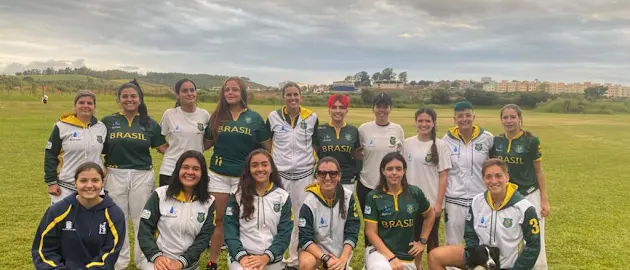How Cricket Brasil rewrote the playbook with women’s contracts


Lara Bittencourt made a choice in January 2020, which changed their life. They decided to commit to being a cricketer full time with Brazil’s women’s national team.
“My diet has changed, my lifestyle has changed and even my social group of friends has changed,” the 18-year-old off-spinner said. “This is what I want to do, so I knew that I would have to make plenty of changes, but it’s a great experience and each day that passes I know I have made the right choice.”
Putting in the work alongside Bittencourt for five days a week is 15-year-old Laura Cardoso. A right-hand batter and medium-pacer with the national team, Cardoso had been showing exceptional cricketing talent right from when she was a 12-year-old participating in Cricket Brasil’s community projects and quickly rose up the ranks.
Matt Featherstone on growth of cricket in Brazil
Now, she balances school and a demanding cricket schedule. But, according to mum Aline, Cardoso is more disciplined and responsible than ever. She is determined not to let this opportunity slip.
Bittencourt and Cardoso were among the 14 players who were handed Brazil’s first full-time professional contracts for female cricketers in January 2020. The path-breaking decision by Cricket Brasil not only gave their lives new direction, but also served as a boost to cricket in the football-loving country and earned Brazil plaudits globally for its strides in women’s sport.
The initiative has now won recognition at the ICC Global Development Awards in the 100% Cricket Women’s Cricket Initiative category. The mayor of Poços de Caldas, a city around 150km from Sao Paolo and the cradle of cricket in Brazil, begins every speech with "I'm the mayor of Poços de Caldas, the Brazilian city where more kids play cricket than football"; now, he has one more achievement in cricket to be proud of.
For the contracted players – the number in 2021 was increased to 15 – being professional involves receiving a monthly payment to pursue cricket. They train for five days a week from 1pm to 5.30pm at the high-performance centre and have gym sessions four days a week with personal trainers. At the centre, they have access to doctors and experts to guide them on their diet and mental health. From 2022, the one-year contracts also have a pregnancy clause.
#IWD2021
— Cricket Brasil (@brasil_cricket) March 11, 2021
“Extraordinary Women - Cricket Brasil”
When you feel the love for the game since a very young age!
A Women's place is in sports too!
Our little girl, Laura Cardoso! ❤️
#Mulheresextraordinárias #CricketBrasil #iwd2021 pic.twitter.com/ZnIi6PPqD4
Depending on their age, some are expected to attend the local physical education university in the evening for a four-year degree.
All of them are required to help with community development programmes – the very programmes that saw them introduced to cricket. The association wants them to be the role models for the next generation of girls and boys taking up the sport.
Cricket Brasil’s decision to award female contracts was especially significant because they became the first Associate country to fully contract the women’s team before the men’s.
It made perfect sense for the Association: the Brazil women are ranked higher (No.27) than the men (No.71, as on April 19) on the MRF Tyres ICC T20I Team Rankings. The women had won four of the last five South American championships and were best placed to break into the top tier of Associates, opening up opportunities for funding and global competition. Perhaps, with the right support, there might even be a World Cup appearance in a few years.
Besides, while people did play a game called ‘taco’ or ‘bete ombro’ on the streets, which resembles cricket in some ways, the country had no longstanding tradition of the sport. That meant there was no opposition to looking at the women’s game as the vehicle for growth, rather than the men’s.
Training Saturday!
— Cricket Brasil (@brasil_cricket) February 13, 2021
Do you want competitiveness? Basic drill. #cricket #cricketbrasil #timecricketbrasil #werun4cricket pic.twitter.com/esc9nb8x3X
Matt Featherstone, Cricket Brasil development director, explained how being a new sport became an advantage when it came to being a gender-balanced sport. “We had a complete blank piece of paper as far as ideas and conceptions of the game,” he said. “This is not the case in many countries where the game has been played for hundreds of years and comes with many protocols.
“So it was our job to firstly let the Brazilians give it a bit of their natural flair and most importantly start it as a game for both sexes. It has never been a ‘male’ or ‘female’ sport in Brazil, but always a sport for all. This helps massively as in our cricket programmes we are almost at a 50/50 split between the genders.”
Plenty of work went into making these contracts a reality. A big part of it was speaking to the parents of players, putting their mind at ease about the opportunities in cricket and getting passports ready for the players.
“Our biggest concern was not how the players would react, as they have been around cricket for quite some time, but how their families would,” said Featherstone. “You have to imagine many people still don’t really know what cricket is in Brazil and the thought that their daughters where going to embark on a career in a sport that is not the most advertised sport in Brazil or South America was quite daunting.”
But with initiatives like this, more Brazilians are beginning to embrace the sport and the team as their own. The story of cricket in the country, which began in Poços de Caldas in 2009 with 26 children from the local orphanage, is only growing. Today, there are 5000 children playing at 50 schools, taught by local coaches, many of whom are the first in the families to go to university and making a social impact in disadvantaged communities.
Next, the Association has ambitious plans to expand to 33,000 participants in neighbouring areas once COVID lifts. If all goes well, there will be more mayors echoing the one from Poços de Caldas, and finding another beautiful game flourishing in their neighbourhoods.


